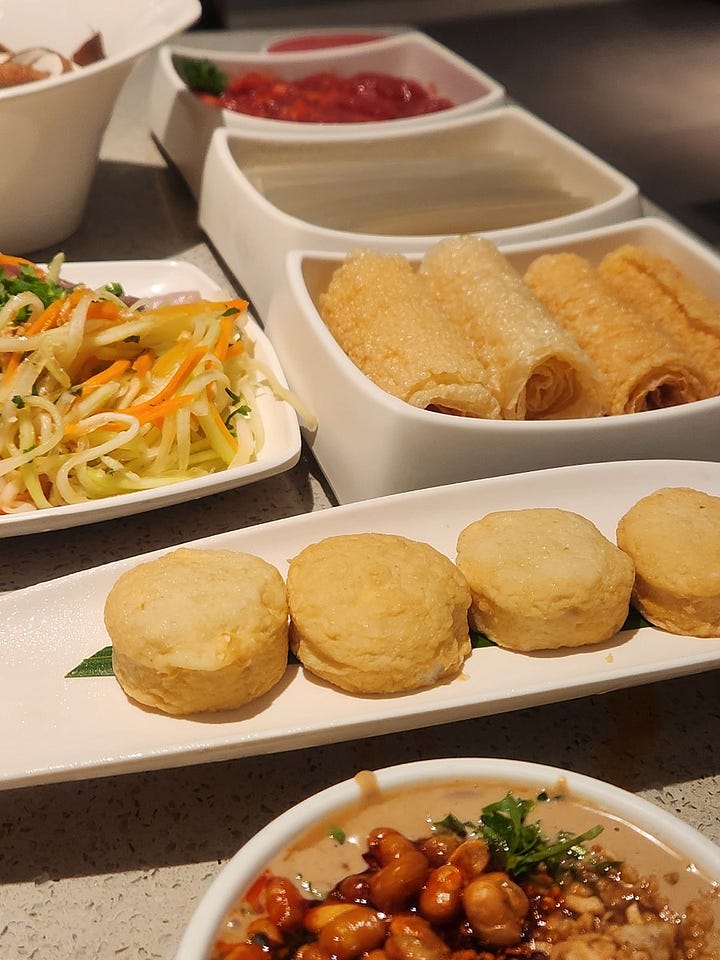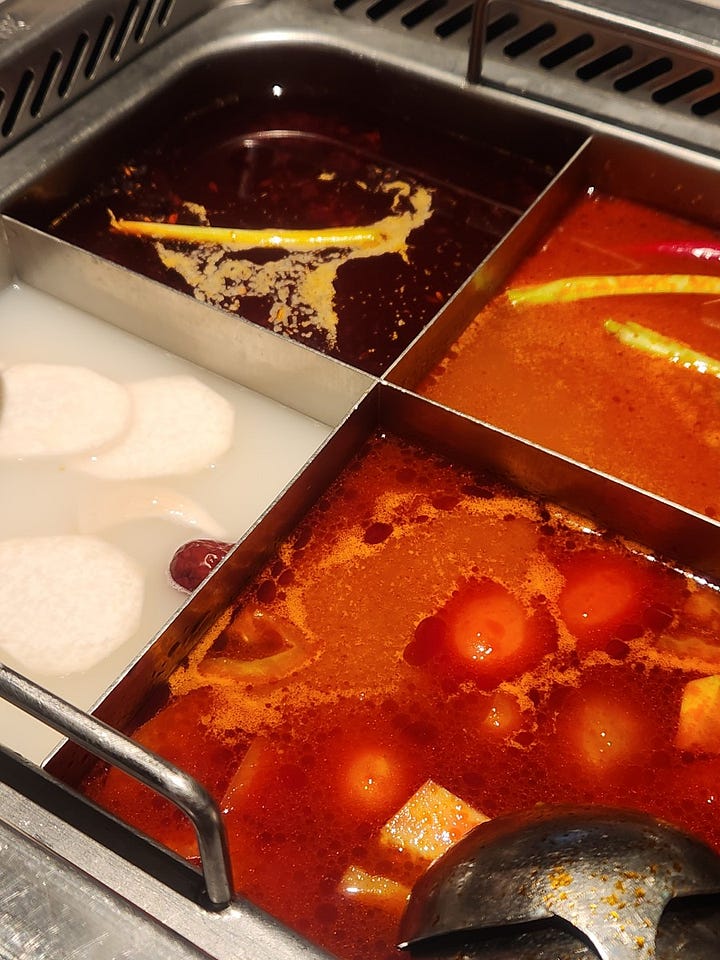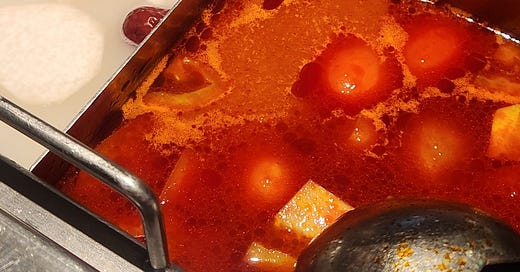Haidilao, Capitalism and the Manufacturing of the Utterly Useless, Entitled Customers
Nobody infantilises you like a) a white man with Asian fetish and b) the service practice of Haidilao as a F&B powerhouse. Alas, capitalism thrives while we continue our mutually abusive cycle.
Haidilao restaurants are always in high demand regardless of location. Birthday dinner? Haidilao. Lunch with colleagues? Haidilao. Farewell party? Haidilao. Alone recharging time? Haidilao. It is almost impossible to secure a table after 5pm if reservation has not been made at least early in the same morning. I, despite rarely going there, have had a fair share of hang-outs at Haidilao. As though it is inescapable from the cultural thwart of this steamboat powerhouse as long as East Asian culture is present where you live.
Nonetheless, I try not to. For it is one of the rare instances where I feel the wrath of capitalism the clearest. From the constant head bow whenever I walk out of my seat, the cooking at my table, the endless drinks refill, the nails painting, birthday parades, to the surveillance-style catering. All under the Haidilao package of superb food, superb service.


For those who are unfamiliar, Haidilao is a popular steamboat (hotpot) franchise known for their overpriced and delicious Chinese style hotpot. Their service is branded as quirky, attentive yet professional. This franchise has set the standard for the new service industry with waitresses doing the most out-of-pocket things for customers upon requests, as parts of the service. Queueing for table? You'll be provided with snacks, drinks, ice cream and nail care services. Have long hair? No worry they provide female customers with hair ties regardless of the length (I was semi-bald at one point and their reflex memory was to give me a hair tie). Eating alone? Employees will come talk to you, offer extra attention, give you teddy bears to hold under the assumption that… you are lonely. Have a cake with you? They will bring out happy birthday signs and start singing for you, also under the assumption that it is your birthday. Waiting for food? Employees will prep the ingredients and cook for you right at your table. Your kids acting up? Employees too will handle them.
Some are service workers, some are waitresses plus therapists plus nails techs plus babysitters
Capitalism is a bottomless pit of demands. Once a demand is met and becomes the market's standardised practice, businesses have no other choice but to push that boundary to a new high. But this “new high” is hierarchized, meaning whoever owns capitals (others’ labour) gets to decide who now has to do the extra work in order to generate his incomes. Normally it is essential workers who do the hard work. In this case, Haidilao's workers pay the price. What is now known as the common service a customer can receive did not born out of thin air, nor was it common years ago. It is a result of having to compete with countless food franchises whose capability to deliver similar quality foods with even possibly cheaper prices exist.
The common consensus in Vietnam and Singapore at least is that Haidilao is delicious; delicious foods are not that hard to find but here I am treated like kings. “Customers are kings”, “customers are never wrong” are the few infamous slogans historically used in F&B industry. Hell, the Chinese-Korean eatery in front of my old university has these printed and hung on the entrance even. Not only does this reflect the reality of how vulnerable service workers are to exploitation and abuse, it also rings a painful sound - entitled customers are born out of capitalism. It is the very few ways the exploited proletariat, who is now granted a new role aka a consumer, momentarily live the aspiring life of a capitalist. This is partially true; we are too familiar with the cliché yet accurate “hurt people hurt people” line. Capitalist culture preaches an aspiration to make “it” - with “it” being “the top”, without informing the masses the cruelty of this process. The view on top is great, because one simply remains blind to the broken back on which they are standing in order to "succeed”. There's no top with the bottom (socially, economically and sexually!)
Pinpointing customers as the sole abusers ignores the abusive system that enables and standardises violence. Haidilao is the proliferator of this system - the pioneer in the service industry, some may say. But they, too, are a mere cog running in a grander system that treats service workers as disposable. Tipping culture is rampant in North America because wages alone are not sufficient to survive. Extra shifts exist because wages alone are not sufficient to survive. The service sector, notably F&B, requires physical and emotional labour yet being branded as low-skill and therefore justifies the low pay. Without making assumptions regarding Haidilao's wage, I argue that no amount of money suffices the inhumane workload of a Haidilao's employee, works that traditionally range beyond F&B services. This, by no means, suggests that the traditional model to service work is humane or just. As long as servitude is understood as a top down business instead of being of service of the people, it is destined for dehumanisation.
Manufacturing useless and entitled customers
Haidilao's babysitting service is, to the very least, insulting to both customers and employees. By babysitting, I mean the extreme surveillance-adjacent catering. This surveillance functions on the basis of circulating oppression..
While the sole intention is to put a classist emphasis on the gap between the roles that are customers and workers. Where one can afford and the other, in contrast, is the subject to be afforded. Oppressive behaviours, like a boomerang, return the dehumanisation to its thrower and hence, Haidilao customers dehumanise themselves being both participants in the classist consumerism while consenting to being incapacitated by entitlement/uselessness. The latter is particularly demonstrated by the infantilisation of this form of service. Feudalism may have glorified catering to feudal lords and kings as though they were new-borns, the current F&B industry monitored by giants surely safeguard this model of power distribution by making it a customer-worker one.
There are many racial indicators to every class analysis but here I would like to focus on the infantilised aspect of this power dynamic as I speak to a racialised reality where Asian women are too treated as infantilised subjects to afford amongst Westerners. As an Asian woman, I have experienced both - being made a racialised infantile subject up to the Western reach. The similarities of the service worker and Asian women mount to a surprising amount, but the bottom line is, the subject of infantilization is told to feel flattered by their own dehumanisation. Such a flattering feeling is often backed by arguments suggesting the workers/women are being pursued. With the former being praised with diligence and the latter, a racialised approval.
There is absolutely nothing normal with being catered like loyalty by workers whose wage is not even minimum. I thought many of us have agreed on the ugly of monarchy and feudalism. But when it is rebranded under a different palette, we blissfully ignore the detriments this systemic setting brings about, gleefully enjoying the short moment of "being a king”. If we are to believe in “nobody’s born hateful, hate is taught”, then we ought to abolish the desire to be abusive to service workers. Because there is absolutely nothing natural in wanting to milk the physical, emotional, mental labour out of a wage worker so it is worth the money one spends.
Being treated like a king is, ironically, the most effective way of proving yourself has the capacity of a toddler, a mean one to say the least. While there is nothing faulty in having different levels of physical and emotional performance, the self-humiliation lies in deliberately choosing to be served to the tee by workers who are trapped in the position to always say “yes”.
They, us, we
Every sustainable and healthy relationship is, by nature, anti-capitalist. Or dare I say communistic. The fundamental protocol here is reciprocal, which requires all participants to engage in a constant dialectic of give-and-take. To oversimplify, you give to take to give, and so do I. Although it is ironic to apply marxist theory to an inherently unbalanced dynamic like one between customers and service workers. The idea of seeing the workers serving you as a human being doing their job instead of objects of servitude, challenges the gratifying reality of this industry - one inflates customers with “I pay your life” ego to unleash the worst type of abuse. From the Marxist lens, the role of the customer and the employees are not all that different. While the customers ought to make requests conscious of THEIR needs and the EMPLOYEE's humanity, the employees must be able to respond with consideration regarding THEIR capacity and the CUSTOMER's humanity. Now, it becomes a cycle of functioning with awareness regarding others.
To which limit can one say no?
Sharing the ridiculous things Haidilao employees do for customers online is a big thing, considering how broad the service spans. This begs the question, when can the employees say no. What does that look like? How will people react to service workers rejecting customer's requests and what kind of backlash it entails? Why is “no” such a taboo within the service industry, and since when is it considered so? Especially in the age of preaching mental health with therapy talk like “boundary”. Where exactly is the boundary for service workers? Does it even exist? Who gets to benefit from the concept “boundary” and who doesn't?
None of us exist outside the capitalist equation. This implies more than just our complicity or potential to harm. Hence, the duty of reckoning with our roles in maintaining this oppressive system is inevitable. A violent system can only teach violent practices. The traumas inflicted upon us at work are doomed to be re-enacted to those who are more marginalised, with the clear example of Haidilao workers. What is it that us who love good food as eaters demand infantilizing services that abuse all parties involved? Since when does the innate desire to eat and eat well become attached to the unrealistic convenience at the expense of our fellow human beings? Don't we all want to eat food, and even more specifically, food that doesn't cost humanity?




The fuck is Haidilao? (I got stuck staring at the food pics and could not process any words)